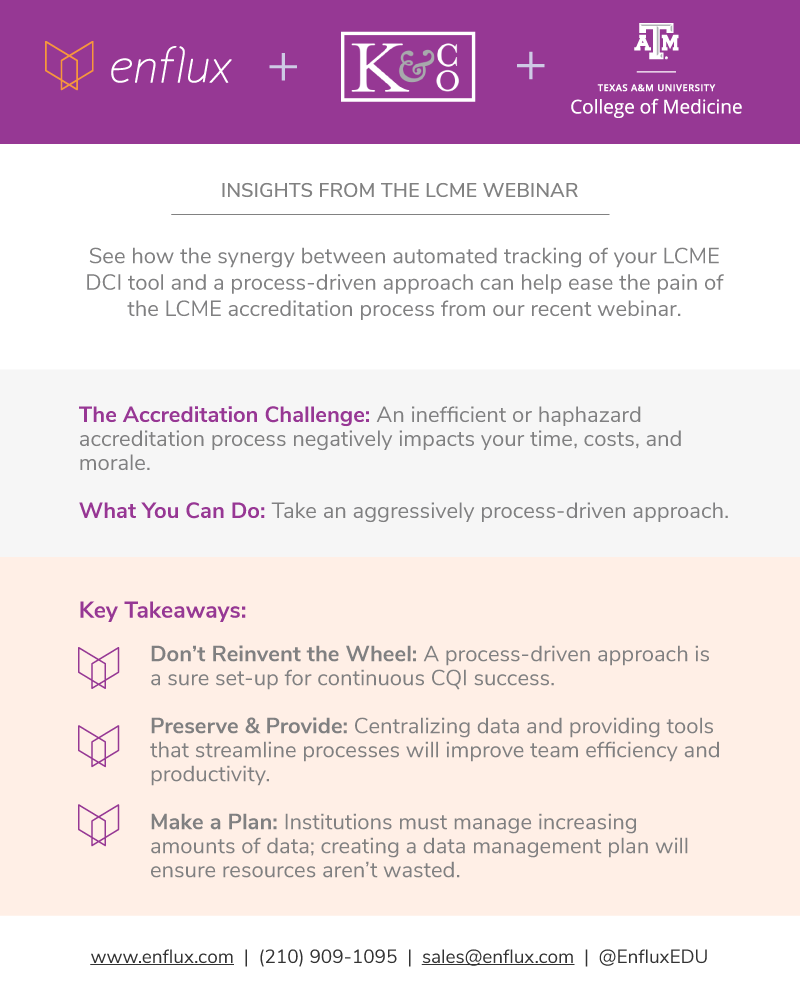Background
If you recently finished an accreditation visit, then you know how vital data is to the accreditation process and how it can be used for benchmarking.
The need to report programmatic information on a regular basis is becoming more urgent. Programs are responding by implementing processes to gather, manage, and report that information. Simultaneously, ad-hoc reporting is also increasing because stakeholders have more questions about the current state of their programs. As a result, the way information is shared and displayed has been revolutionized. Although spreadsheets and infographics are still used, having the ability to interact with data through dashboards is now almost regarded as an industry standard.
In the case of Higher Education, it is a marketplace governed by five domains, and institutions have to show data-backed evidence that they are efficient and effective in all of them:
- Accessibility – Who is attending or not attending your institutions?
- Affordability – Are your tuition and fees comparable to other institutions? Do you offer scholarships?
- Accountability – Are you doing as well as your peers? Are you accredited?
- Sustainability – Are you able to tell your story effectively to your stakeholders and donors to retain financial stability and continue operating as an effective institution?
- Differentiation – Why would your school choose you over others?
In order to work efficiently and effectively in the new environment, your program needs to address these questions:
- What are your data sets?
- What are your tools?
- How do you schedule your work?
- How do you secure your work?
- Is what you’re doing sustainability?
- How are you reporting or sharing?
Programs that just went through the pain of completing the DCI and a site visit process certainly don’t want to overtax their teams and resources again by going through this intense process.
So they look for solutions that keep their DCI up to date without deploying resources and allow for them to go back on a regular basis to update information. This way, when it comes time for a site visit, they don’t have to go on a treasure hunt to find who has what data and how they went from point A to be B while making changes to the curriculum.
The best practice to solve for this issue is to implement a tool that centralizes data, processes, and institutional knowledge in order to enhance the benefits of a site visit.
Once implemented, an efficient accreditation process can have a positive impact on time, cost, and morale. Additionally, a process-driven approach is a set-up for CQI success, preventing institutions from having to reinvent the wheel during subsequent site visit cycles.
Conversely, insufficient response in the data collection instrument and self-study is the most significant process issue linked to reasons for severe action decisions (SADs) against programs.
So how do you know when it’s time to stop running your program in spreadsheets? When the time between gathering data and analysing it takes so long and wastes so many resources (people and money) that little value is obtained from it.
In addition to providing you with the right, up-to-date data when you need it, good data management practices can have positive impacts on accreditation, marketing, donor relations, and other areas. As such, it’s imperative that programs take steps to adequately manage and present data for continuous improvement and success to be possible.
Webinar Speakers


Principal Consultant at Kennedy & Company Education Strategies and Former Associate Dean of Medical Education

Assistant Dean of Continuous Quality Improvement at Texas A&M University System Health Science Center – College of Medicine

Watch Recording
Additional Resources
Ryan Palmer, EdD, MFA
Accreditation can be painful, but it doesn’t have to be. Learn how Ryan Palmer a Principal Consultant at Kennedy & Company Education Strategies has found ways to ease the pain of accreditation processes. With his methods, the self-study doesn’t feel like running a marathon without training which will likely make it so painful that you won’t want to participate in another one again.

